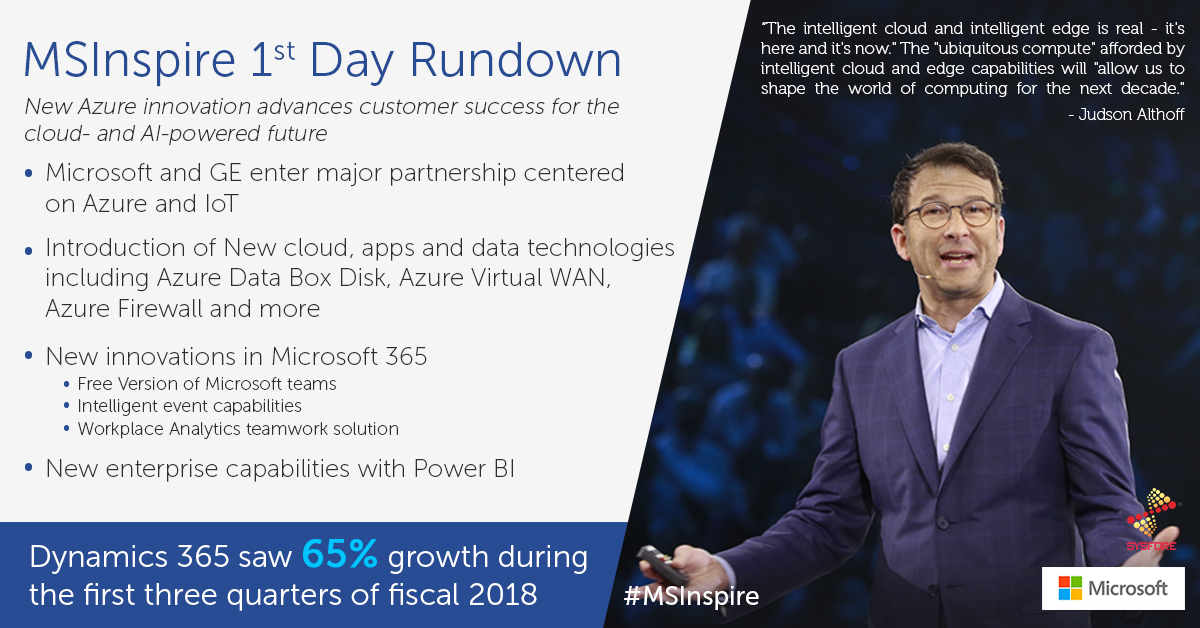Microsoft Inspire 2018, formerly called Worldwide Partner Conference (WPC), continues in Las Vegas. Check this ongoing blog for live Azure Cloud and Dynamics 365 partner news updates, and perspectives throughout the day.
19/07/2018: Day 3: After a full three days of action, Microsoft’s annual partner-focused Inspire conference is finally set to wrap up tomorrow. We’ve seen tons of Azure, Microsoft 365, Dynamics 365, and Microsoft Cloud news throughout the week
Yesterday Microsoft CEO Satya Nadella took the center stage at Inspire 2018 with an extended round of standing ovation, before he’d even said a word. In case if you missed the keynote, you can always watch it here.
Here are few of the updates from Day 3
- Microsoft Teams Monitoring: GSX solutions has come up with Microsoft teams monitoring and performance reporting capabilities
- Automation capabilities on Microsoft Azure Managed service
- Azure Cloud Security: Customers can now gain modern vulnerability management, analytics-driven incident detection for hybrid environments, and simplified agent deployment within the Azure infrastructure
- Azure reserved instances will available across all Azure workloads
- Azure information protection – unification of data loss prevention in the ‘search and compliance center’ labels and AIP
“Day 3 – Keynote”
18/07/2018: Day 2: Watch the Day 2 Keynote here
Day 2 of Microsoft’s biggest event for Partners, Microsoft Inspire 2018, featured Gavriella Schuster, Corporate Vice President, One Commercial Partner; Jason Zander, Executive Vice President, Microsoft Azure Team in the Cloud and AI group; Ron Markezich, Corporate Vice President, Microsoft 365; Alysa Taylor, Corporate Vice President, Cloud and Enterprise Business Applications and Global Industry; and Anand Eswaran, Corporate Vice President, Microsoft Digital, Services, and Success
“Day 2 – Highlights”
Here are few of the updates from Day 2
- Walmart-Microsoft Azure Partnership
- Azure for MSPs: Cloud distributor Pax8 unveiled a Wingman Professional Services Program. The offering allows MSPs to leverage customized IaaS solutions built by Pax8 cloud architects and engineers
- ClearDATA has launched “healthcare compliant” cloud services for Microsoft Azure.
- Dell EMC Cloud for Microsoft Azure Stack announced that the on-premises extension to Microsoft’s public cloud supports a variety of file formats now
- Workspace as a Service: CloudJumper has unveiled Cloud Workspace for Azure
17/07/2018: Day 1 – Watch the Day 1 keynote here
“Day 1 – Highlights”
Here are few of the updates from Day 1:
- Office 365 Accelerator: Office 365 accelerator reduces latency, packet loss and network congestion experienced by branch office and mobile users when accessing Office 365 cloud applications via the public Internet
- GE and Microsoft: Expanded partnership will help industrial companies capture greater intelligence from IoT and asset data, boosts GE innovation across its business
Got news to share from the conference? Email me the details (evelyn.dennis@sysfore.com).



